18.0. Counting from the Sun at Φ
Sagittarii (284.0) to the sooty mirror shadow image of the Sun on the
face of the Full Moon at Φ Gemini (118.4)
there were 284 (Eb8-22) - 268 (Eb8-6) = 16 right ascension days.
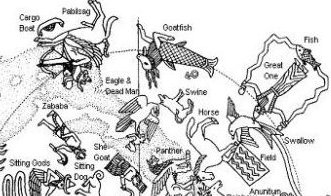
|
Dec 30 (364) |
*16 |
Jan 16 (380) |
 |
 |
|
Φ Sagittarii (*284.0) |
Φ Gemini
(*118.4) |
|
Eb8-6 (268) |
Eb8-22
(284
→
Dec 30) |
|
*284 + *16 = *300 |
AL-TAIR (*300) |

Should we assume the calendar days
were to be measured from the return to visibility late at night of Φ
Sagittarii, then both the Full Moon and the Sun would be there,
the Full Moon in January 16 and the Sun from December 30. In other
words the Sun was immobilized during his final days.

 |
 |
 |
 |
 |
 |
|
Eb8-20 |
Eb8-21 |
Eb8-22
(300 - 16) |
Eb8-23 |
Eb8-24 |
Eb8-25 |
|
te henua |
ihe tapamea |
te rima to kava |
tagata
rere ragi - te henua |
tara hoi |
te goe |
|
... Kava will make the eyes more sensitive,
generating an illusion of returning light ... |
|
July
15 (196) |
16 |
17 |
18 |
19 |
20
(201) |
|
Mash-mashu-arkū-11 (Eastern One
of the Twins)
κ Gemini
(116.1),
POLLUX = β Gemini
(116.2),
π Gemini (116.9) |
AZMIDISKE (Little
Shield) =
ξ Puppis (117.4)
*116.0 = *117.4 - *41.4 |
Φ Gemini (118.4)
*117.0 = *118.4 - *41.4 |
DRUS (Hard) = χ Carinae
(119.9) |
ω Cancri
(120.2) |
8h (121.7)
χ
Gemini (121.0),
NAOS (Ship) = ζ
Puppis
(121.3) |
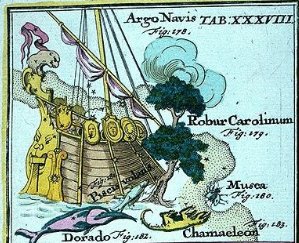 |
|
→ VISIBLE CLOSE
TO THE FULL MOON: |
|
β
Sagittae (298.0),
χ
Aquilae (298.3),
ψ
Aquilae (298.8)
Jan
14 (378) |
υ
Aquilae (299.1),
TARAZED =
γ
Aquilae
(299.3),
δ
Sagittae (299.6),
π
Aquilae (299.9)
Jan 15 |
Sravana-23
TYL = ε Draconis (300.0),
ζ Sagittae (300.1),
ALTAIR = α Aquilae
(300.3), ο Aquilae (300.5),
BEZEK = η Aquilae (Ant.)
(300.8)
Jan 16 |
ι
Sagittarii (301.2),
TEREBELLUM = ω Sagittarii,
ξ Aquilae (301.3),
ALSHAIN = β Aquilae
(301.6), φ Aquilae (301.8)
Jan 17 |
ε
Pavonis, θ Sagittarii (302.3), γ Sagittae (302.5), μ Pavonis (302.7)
Jan 18 |
τ
Aquilae
(303.8)
Jan 19
(383) |
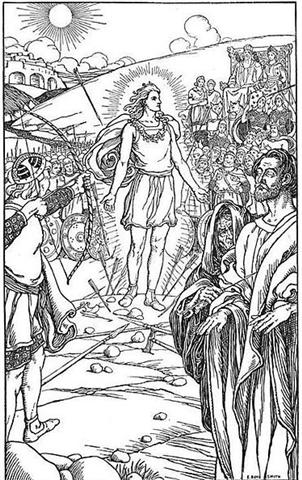 |
3 days later Eb8-25 seems to illustrate the Full Moon and
Sun looking at each other. This was 29 days after
December 20 (354).
|
Dec 20 (354, *274) |
*10 |
Dec 30 (364, *284) |
*16 |
Jan 16 (380) |
*3 |
Jan 19 (383) |
 |
 |
 |
 |
|
Eb7-38 (584) |
Eb8-6 (268) |
Eb8-22
(284
→
Dec 30) |
Eb8-25 (287) |
|
ο Herculis (*274.0) |
Φ Sagittarii (*284.0) |
Φ Gemini (*118.4) |
NAOS (*121.0) |
|
*274 + *26 = *300 |
*284 + *16 = *300 |
AL-TAIR (*300) |
Τ
Aquilae (*303) |
... In the Northern Hemisphere the
coldest day on an average is January 19. From winter
solstice (day 355) to day 365 + 19 = 384 (i.e. ½ more than 13
* 29½) there are 29 days ...
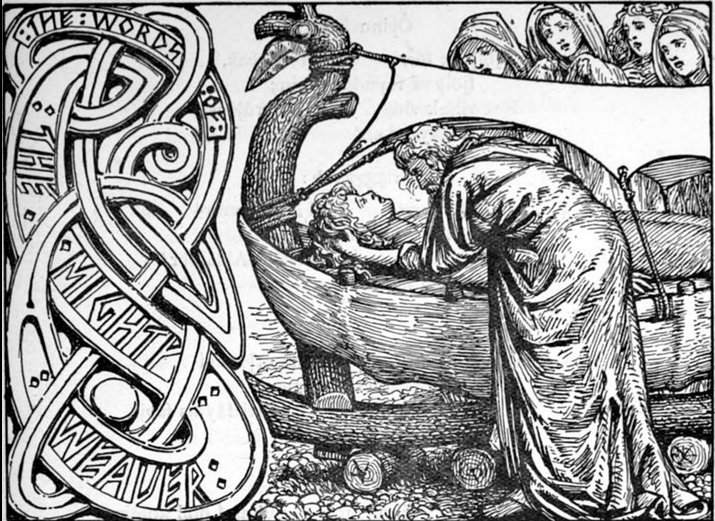
The Word Naos means Ship and when the Full Moon reached
this place both the immobilized old year and his wife were
to be carried onboard:
... According to Gylfaginning,
following the murder of Baldr by Loki, the other gods
brought his body down to the sea and laid him to rest on
the ship. They would have launched it out into the water
and kindled a funeral pyre for Baldr but were unable to
move the great vessel without the help of the giantess
Hyrrokkin [→
Hurricane], who was sent for out of Jötunheim. She
then flung the ship so violently down the rollers at the
first push that flames appeared and the earth trembled,
much to the annoyance of Thor. Along with Baldr, his
wife Nanna was also borne to the funeral pyre after she
had died of grief. As Thor was consecrating the fire
with his hammer Mjolnir, a dwarf named Litr began
cavorting at his feet. Thor then kicked him into the
flames and the dwarf was burned up as well ...
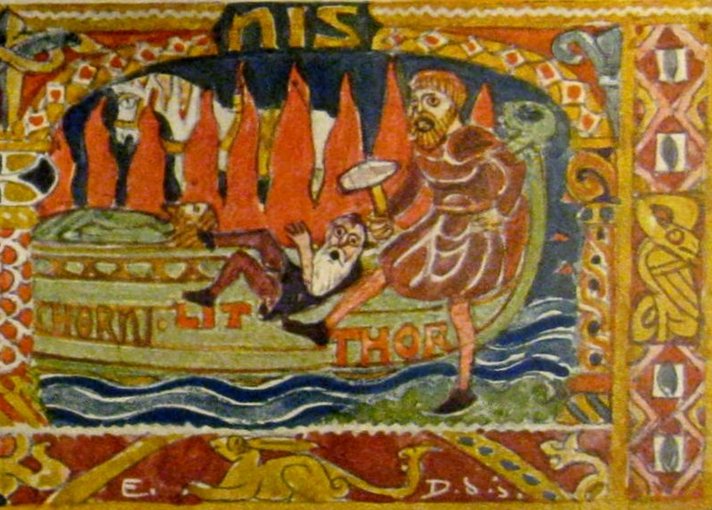
Could the coming sea journey have covered 9 days, which is the number of
glyphs remaining in the E text? Metoro said we should
count (hia) at January 20, possibly because here the boundary
at 13 * 29½ = 383½ had been crossed over (Χ).

|
 |
34 |
 |
12 |
 |
39 |
 |
|
ka hakatu ma te rima |
te toga |
hagahaga mai o te ragi |
te tagata |
|
Eb6-17 (326 + 201 = 527 = 628 - 101) |
Eb7-16 (236 → 8 * 29½) |
Eb7-29 (249 → 3 * 83) |
Eb8-27 (188 + 101) |
|
Oct 24
(297 → *360 - *184) |
Nov
28 (332 = 297 + 35) |
Dec 11 (345, *265) |
*264 + *41 |
|
April 25 (115) |
May
30 (150 = 115 + 45) |
June
12 (345 - 182) |
TEGMINE (123)
July
22 (203) |
|
ρ Ceti (35.4)
*360.0 = *35.4 - *41.4 |
No
star listed (70) |
CRAB
NEBULA (M1) |
 |
 |
 |
 |
 |
|
Eb8-26 (188 + 100) |
Eb8-27 |
Eb8-28 (584 + 32) |
Eb8-29 (291) |
|
hakavari hia mai
kia iri |
te tagata |
kua moe |
mata ihi rarua |
|
Kiakia. Dove, gull T.
Mgv.: kiakia, the cry of the kotake
(a white marine bird.) Churchill.
Vari. 1. Menstruation, period (also:
tiko). 2. To tack, to veer (nautical);
ku-vari-mai-á te miro, the boat arrives,
have veered [around Rano Kau]. Vanaga.
About, circumference, to turn in a circle;
hakavari, pliant, to bend, square;
varivari, about, to go around; vavari,
a garland; varikapau, circumference, to
surround, a compass, to admire; hiriga
varikapau, to go in a ring; pa varikapau,
to close in; varitakataka (vari-taka
3) to surround. Churchill. Pau.: Vari,
marsh, mire, dirt. Ta.: vari, dirt, mud.
Rar.: vari, mud. Churchill. Mgv.: Vari,
paste well diluted. Mq.: vaivai, to
dilute, to thin. Ha.: waliwali, soft,
pasty. Churchill.
Iri. 1. To go up; to go
in a boat on the sea (the surface of which gives
the impression of going up from the coast):
he-eke te tagata ki ruga ki te vaka, he-iri ki
te Hakakaiga, the men boarded the boat and
went up to Hakakainga. 2. Ka-iri ki
puku toiri ka toiri. Obscure expression of
an ancient curse. Vanaga. Iri-are, a
seaweed. Vanaga.
Ihi. 1. Line of singing
women at a feast or an êi. 2. Ihi,
ihi-ihi, to break up into small pieces,
to crumble, to tear to pieces; he-ihi i te
maúku, to separate fibres. Vanaga. Ihiihi,
to hop. Churchill. |
|
July 21 (202) |
22 |
23 |
24 |
|
ρ Puppis (122.0),
HEAP OF FUEL =
μ
Cancri
(122.1),
ζ
Monocerotis (122.3), ψ
Cancri (122.6),
REGOR (Roger backwards) =
γ
Velorum
(122.7) |
TEGMINE (The Cover) =
ζ
Cancri
(123.3) |
AL TARF (The End) =
β
Cancri
(124.3)
RAS ALGETHI (α Herculis) |
χ
Cancri (125.2),
BRIGHT FIRE =
λ
Cancri (125.4)
*84.0 = *125.4 - *41.4 |
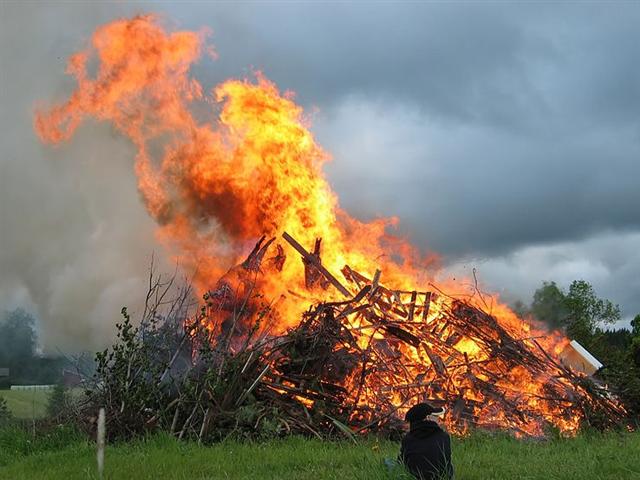 |
|
→ VISIBLE CLOSE
TO THE FULL MOON: |
|
20h (304.4)
304.4 = 118.4 + 186.0
η Sagittae (304.2),
δ Pavonis (304.4)
*263.0 = *77.0 + *186.0
(384 = 364 + 20) |
SHANG WEI (Higher Guard) =
κ
Cephei
(305.2),
θ
Sagittae (305.4),
TSEEN FOO (Heavenly
Raft) = θ Aquilae (Ant.)
(305.6), ξ Capricorni (305.8)
*264.0 = *305.4 - *41.4 |
TSO KE (Left Flag) =
ρ
Aquilae
(306.3) |
GREDI (Goat) =
α
Capricorni
(307.2),
σ
Capricorni (307.5),
ALSHAT (The Sheep) =
ν
Capricorni
(307.9) |
 |
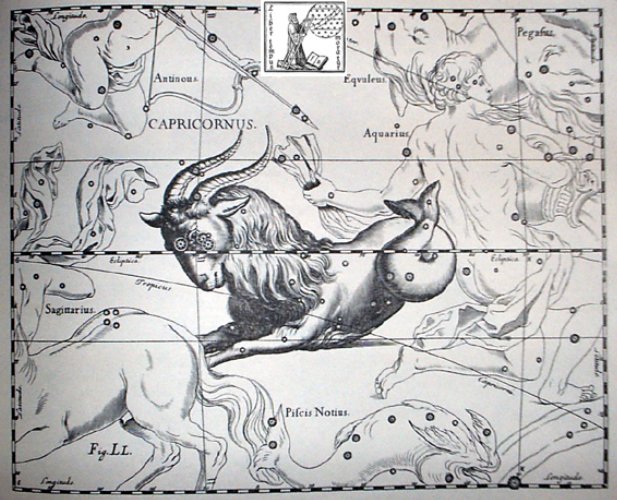
 |
 |
 |
 |
 |
|
Eb8-30 |
Eb8-31 |
Eb8-32 (584 + 36) |
Eb8-33 (284 + 11) |
Eb8-34 |
|
te maitaki |
te kava - hokohuki |
kua oho mai - tagata iri rima ki te puoko |
ihe rima |
te hou ua |
|
Hou. 1. To perforate, to
drill. P Pau.: fakahou, to furrow, to
groove, to plow. Mgv.: hou, ouou,
a drill, a wimble, a borer, a gimlet, to pierce
with a drill. Mq.: hou, an auger, a
drill, a wimble, corkscrew, to pierce with a
drill. Ta.: hou, auger, to drill. 2. New,
fresh, modern, recent, young, youth; rae ki
te mea hou, to innovate; hou anei,
modern. Hakahou, to reiterate,
reparation, to restore, to recapitulate; haga
hakahou, to make over, to renew, recovery;
avai hakahou, a loan, to borrow; rere
hakahou mai, to rebound; hakahou iho,
to recommence. P Pau.: hou, young, new.
Mgv.: hou, new; akahou, to renew.
Mq.: hou, new, recent, fresh, young. Ta.:
hou, new, recent, before. Churchill. |
|
July 25 |
26 |
27 |
28 |
29 (210) |
|
AVIOR =
ε
Carinae (126.4),
φ
Cancri (126.8)
*85.0 = *126.4 - *41.4 |
Ο Ursae Majoris (127.4)
*86.0 = *127.4 - *41.4 |
Pushya-8 (Nourisher)
υ Cancri (128.1), θ
Cancri (128.2) |
Āshleshā-9 (Embrace)
/
Willow-24 (Stag)
π¹
Ursa Majoris,
δ
HYDRAE (129.6),
AL MINHAR AL SHUJĀ = σ Hydrae,
MUSEIDA =
π²
Ursae Majoris
(129.9)
RAS ALHAGUE (α Ophiuchi) |
Al Nathrah-6 (Gap)
BEEHIVE (Exhalation of Piled-up Corpses) = ε
Cancri, η Pyxidis (130.4),
XESTUS
= ο Velorum
(130.5), ζ Pyxidis (130.7),
ASCELLUS BOREALIS = γ Cancri, β Pyxidis (130.9)
*89.0 = *130.4 - *41.4 |
 |
|
→ VISIBLE CLOSE
TO THE FULL MOON: |
|
Al Sa’d al
Dhabih-20 (Lucky One of the Slaughterers)
/
Ox /
Heard Boy (Buffalo)
DABIH =
β
Capricorni (308.0),
κ
Sagittarii (308.1),
SADIR (Hen's Breast) = γ Cygni (308.4),
PEACOCK =
α
Pavonis
(308.7)
*267.0 = *308.4 - *41.4 |
KHUFU
OKUL =
π
Capricorni
(309.6),
BOS =
ρ
Capricorni
(309.9)
ARNEB (α
Leporis)
MINTAKA (δ Orionis) |
KHAFRE
ο
Capricorni (310.2),
θ
Cephei (310.5)
HEKA (λ Orionis)
ALNILAM (ε
Orionis) |
MENKAURE
ROTTEN MELON =
ε
Delphini,
φ
Pavonis (311.2),
η Delphini (311.4),
ζ
Delphini,
ρ
Pavonis (311.7)
PHAKT (α
Columbae)
ALNILAK (ζ Orionis)
*270.0 = *311.4 - *41.4 |
210 + 182
→
*392
|
.jpg) |

 |
 |
 |
 |
 |
 |
|
Eb8-35 |
Eb8-36 |
Eb8-37 |
Eb8-38 (300) |
Eb8-39 |
Eb8-40 (2 * 314) |
|
tagata |
ihe mama ia |
e
hoea |
mama mamae hia |
ka maramarama |
Mamae mamae
hia |
|
E. Ê, yes. E ... é
disjunct vocative marker. E vovo é!
Girl! E te matu'a é! Father! (Vanaga)
1. By. 2. And. 3. Oh! 4. Yes. 5. Verb sign.
6. Negative verb sign;
e maaa, inexperienced; ina e,
negative sign; ina e rakerakega,
innocent; ina e ko mou, incessant;
e ko, not, except. 7. Wave. 8. Weak
demonstrative, functioning as article.
(Churchill)
Mama. 1. To chew. 2.
To mouth-feed (arch.) he-mama i te vai
tôa koia ko te tiapito kiroto ki te haha o
te poki, she mouth-feeds the child with
sugarcane juice together with tiapito
juice. 3. A sea mollusc (with an
eight-horned shell). Vanaga. 1. To leak, to
ooze, (maamaa). P Pau., Mgv., Ta.:
mama, id. 2. To chew. P Mgv., Mq., Ta.:
mama, id. 3. Light not heavy, (maamaa).
P Mgv., Ta.: mama, id. 4. A limpet (Chiton
magnificus). Mgv., Mq., mama, a
shellfish. 5. To open the mouth; hakamama,
to yawn, to gape, to be ajar. Pau.:
hamama, to open. Mgv.: akamama,
to burst open. Ta.: haamama, to open.
Mq.: haámama, to open the mouth. 6.
Ta.: mama-orero, conclusion of a
council. Ha.: mama, to finish, to
have done with a thing. Churchill.
Mamae. Illness, pain,
to be ill or in pain, afflicted; tagata
mamae,
the sick. Vanaga. Sick, suffering, weak,
ill; mate maia mamae, to depress;
mata mamae, drowsy, sleepy; mamae
kopu, bellyache; mamae keo,
headache; mamae toto, menses;
ariga mamae, to look ill; hakamamae,
to make ill. T Mgv.: mamae, to be
ill, in pain, suffering, sorrow. Mq.:
mamae, memae, suffering, pain,
grief. Ta.: mamae, pain. Churchill.
Rama.
Torch. Fischer. T. Torch. Henry.
Marama. 1. Month,
light. The ancient names of the month were:
Tua haro, Tehetu'upú, Tarahao, Vaitu nui,
Vaitu poru, He Maro, He Anakena, Hora iti,
Hora nui, Tagaroa uri, Ko Ruti, Ko Koró.
2. Name of an ancient tribe. Maramara,
ember. Vanaga. Light, day, brightness, to
glimmer; month; intelligent, sensible; no
tera marama, monthly; marama roa,
a long term; horau marama no iti,
daybreak; hakamarama, school, to
glimmer; hare hakamarama, school,
classroom. P Mgv.: màràma, the light,
daylight; maràma, wise, learned,
instructed, moon. Mq.: maáma, light,
broad day, bright, instructed, learned;
meama, moon, month. Ta.: marama,
moon, month. In form conditionalis this word
seems derivative from lama, in which
the illuminating sense appears in its
signification of a torch. The sense of
light, and of specifically the moon, appears
in all Polynesia; in Futuna and Uvea the
word signifies the world. The tropical
extension to the light of intelligence is
not found in Nuclear Polynesia, therefore
not in the Proto-Samoan, but is a later
Tongafiti development. Maramarama,
bright; manava maramarama,
intelligent. P Pau.: maramarama,
intelligent. Ta.: maramarama, light,
brightness. Churchill. The month sense is
found in Tahiti, Marquesas, Rarotonga and
Maori associated with the moon
signification, and in Hawaii is specifically
dissociated therefrom to characterize a
solar month. Churchill 2. |
|
July 30 (211) |
31 |
Aug 1 |
2 |
3 (*135) |
4 (216 = 176 + 40) |
|
... It
was 4 August 1968, and it was the feast day
of Saint Dominic, patron of Santo Domingo
Pueblo, southwest of Santa Fe. At one end of
the hot, dusty plaza, a Dominican priest
watched nervously as several hundred dancers
arranged in two long rows pounded the earth
with their moccasined feet as a mighty,
collective prayer for rain, accompanied by
the powerful baritone singing of a chorus
and the beat of drums. As my family and I
viewed this, the largest and in some ways
the most impressive Native American public
ceremony, a tiny cloud over the Jémez
Mountains to the northwest got larger and
larger, eventually filling up the sky; at
last the storm broke, and the sky was
crisscrossed by lightning and the pueblo
resounded with peals of rolling thunder
... |
|
Extended Net-26a (Ox)
/
Arkū-sha-nangaru-sha-shūtu-12 (Southeast
Star in the Crab)
η Hydrae (131.0),
ASCELLUS AUSTRALIS =
δ Cancri (131.4),
KOO SHE =
Bow
and Arrow
=
δ
Velorum
(131.6),
α
Pyxidis (131.8),
ε
Hydrae (131.9)
*90.0 = *131.4 - *41.4 |
ι Cancri (132.0), ρ Hydrae
(132.4)
*91.0 = *132.4 - *41.4 |
γ Pyxidis (133.6) |
ζ
Hydrae (134.1),
ρ
Cancri (134.2),
ζ
Oct.
(134.3), ο Cancri (134.6), δ Pyxidis (134.9 |
ACUBENS
= α Cancri,
TALITHA BOREALIS = ι Ursae Majoris (135.0),
σ Cancri (135.2), ρ Ursa Majoris (135.6) |
ν Cancri (136.0),
TALITHA AUSTRALIS = κ Ursae Majoris
(136.1), ω Hydrae (136.8) |
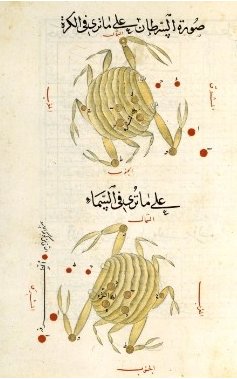 |
|
→ VISIBLE CLOSE
TO THE FULL MOON: |
|
μ²,
μ¹
Oct. (313.2),
DENEB CYGNI (Tail of the Swan) =
α
Cygni
(313.5),
β
Pavonis (313.6),
δ
Delphini (313.8) |
Al
Sa’d al Bula'-21 (Good Fortune of the
Swallower)
/
Dhanishta-24 (Most Famous)
/
Girl-10 (Bat)
YUE (Battle-Axe) =
ψ
Capricorni
(314.3),
GIENAH CYGNI =
ε
Cygni,
η
Cephei (314.5),
γ
Delphini (314.6),
σ
Pavonis (314.7),
ALBALI =
ε
Aquarii
(314.8)
BETELGEUZE (α Orionis) |
BATEN ALGIEDI (Belly of the Goat) =
ω
Capricorni
(315.8) |
μ Aquarii (316.0) |
ε Equulei (317.8) |
No star listed (318) |
|
Jan 28 |
29 (*314) |
30 |
31 |
Febr 1 |
2 (398) |
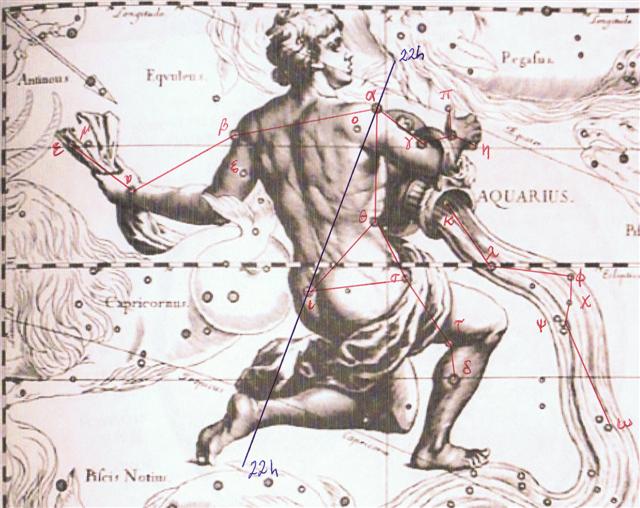 |
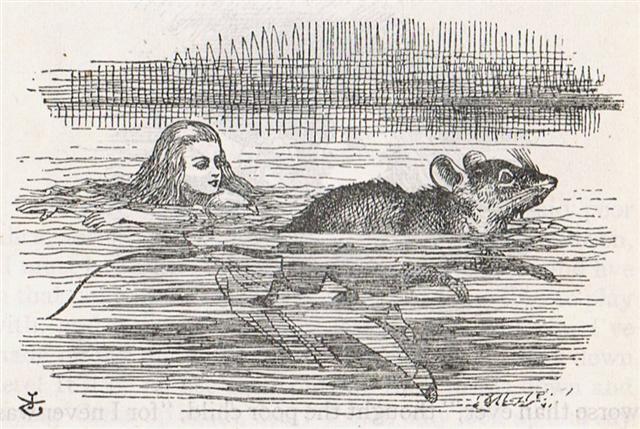
... In China, with Capricornus,
Pisces, and a part of Sagittarius, it [Aquarius]
constituted the early Serpent, or Turtle, Tien
Yuen; and later was known as Hiuen Ying,
the Dark Warrior and Hero, or Darkly Flourishing
One, the Hiuen Wu, or Hiuen Heaou, of
the Han dynasty, which Dupuis gave as Hiven Mao.
It was a symbol of the emperor Tchoun Hin, in
whose reign was a great deluge; but after the
Jesuits came in it became Paou Ping, the
Precious Vase. It contained three of the sieu, and
headed the list of zodiac signs as the Rat,
which in the far East was the ideograph for 'water',
and still so remains in the almanacs of Central
Asia, Cochin China, and Japan ...
|
a1 |
32 |
32 |
b1 |
42 |
368 |
|
a2 |
33 |
65 |
b2 |
27 |
395 |
|
a3 |
35 |
100 |
b3 |
38 |
433 |
|
a4 |
36 |
136 |
b4 |
42 |
475 |
|
a5 |
42 |
178 |
b5 |
35 |
510 |
|
a6 |
39 |
217 |
b6 |
36 |
546 |
|
a7 |
39 |
256 |
b7 |
42 |
588 |
|
a8 |
*34 |
290 |
b8 |
40 |
628 |
|
a9 |
36 |
326 |
sum |
302 |
|
sum |
*326 |
sum total |
*628 |
|


















.jpg)




